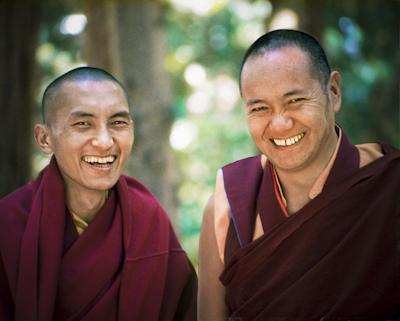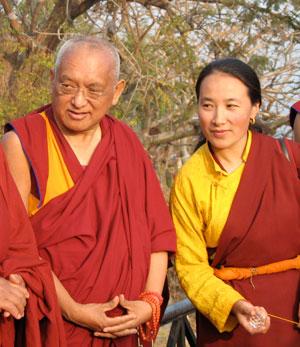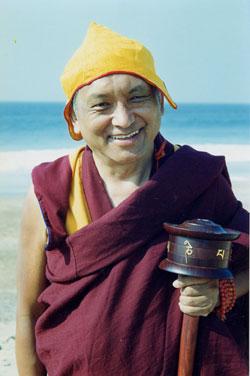E-letter No. 82: March 2010

Dear LYWA Friends and Supporters,
Thank you so much for your kind interest in and support of the Archive. We do what we do—collect, archive, edit, publish and so forth—for the benefit of all sentient beings and without your help it would not be possible.
What People Are Saying
Just the other day our attention was drawn to a letter one of our readers submitted to Mandala magazine for their "Your Words" section. It will appear in a forthcoming issue but in the meantime we've posted it on our website. You can read this letter and the many other letters and notes we've received from our readers over the years. It’s wonderful to receive such feedback. Thank you very much.

We’ve also had many positive responses to our new free book, Lama Zopa Rinpoche’s Kadampa Teachings, and if you have not yet seen it we’d be happy to send you one. If you would like to receive our new books automatically, please become a member or benefactor. Otherwise we’re happy to send you any free books you want—all you have to do is cover the cost of postage.
Other Ways to Read Our Books
We were recently asked how we distribute our books and DVDs. In addition to being able to order them directly from us via the LYWA website, you can also order our publications worldwide through Amazon.com, eBay, Barnes and Noble (who are also carrying two of our titles in their stores), Snow Lion Publications (now Shambhala) and the FPMT Foundation store. Our friends in London can order copies through Wisdom Books, and those in Australia can order them through Mandala Books. [Note: Wisdom Books and Mandala Books are no longer operational.] We also have small distribution organizations in Singapore and Malaysia, thanks to our kind supporters there.
For those of you interested in obtaining electronic versions of our books, there are many choices available to you now, and more are in the works. Almost all of our books are available for Amazon's Kindle, and we are currently working on an electronic format that will be portable to other eBook readers from Sony, Barnes & Noble and more. On the LYWA website you can find html and pdf versions of all of our free books, and excerpts from those we have for sale. Our free books can also be read on GoogleBooks.
Sutra Recitations for Rinpoche

Each year around this time Ven. Roger Kunsang, Rinpoche’s assistant, checks with Khadro-la (whom His Holiness the Dalai Lama consults, similar to the Nechung Oracle) on Rinpoche’s health for the next year. Khadro-la advices a number of things to be done, including what practices should be done to ensure Rinpoche’s good health and long life, the success of all his projects and that all his holy wishes come to fruition.
This year we have been asked to recite the Golden Light Sutra, which can be found here. Khadro-la has recommended 65 recitations, but the more that can be done the better! Please let me know if you are able to complete a recitation.
LYWA Photo Archive
Our digital imaging specialist, David Zinn, has been working hard on our vast collection of over 30,000 photographs and counting. Many of these we have collected for inclusion in our forthcoming (2011) biography of Lama Yeshe, Big Love. Many more images will be made available through our new Online Image Gallery, which is nearly ready to be launched. Each image will have keywords and descriptions that are fully searchable.
David also recently created an FPMT piece as an audio/visual backdrop for the presentation given by the Foundation for the Preservation of the Mahayana Tradition (FPMT) at the Parliament of World Religions in Melbourne, December 2009. You can view the YouTube video below.
And speaking of YouTube, did you know that there’s now an LYWA channel? You can access it here.
What's New on Our Website
Listen online to a series of teachings from Lama Zopa Rinpoche titled In Praise of Dependent Arising, given in Sydney Australia in 1993. During these teachings Rinpoche gives an oral transmission of this emptiness text.
We have recently posted teachings from the 20th Kopan Course from Kopan Monastery in 1987. Included in this series is a talk by Khen Rinpoche Lama Lhundrup, abbot of Kopan Monastery, on Bodhisattva Vows.
You can get a taste of the teachings from the Kopan Course by reading selected excerpts on Reincarnation, The Good Heart, and Training the Mind in Bodhicitta.
This month's e-letter teaching below is an excerpt from Lama Zopa Rinpoche's teachings in Guadalajara, Mexico in April of 2008. You can listen to the audio from the entire series and read along with the unedited transcripts here.
Much love,

Nick Ribush
Director
Attachment and Past Lives

Since I’m talking here on this subject, I’m going to mention this point. It’s good to remember that attachment has not so much to do with the object. It is because of the negative imprint left on your mental continuum by past attachment that you now feel attachment to an object. Remember that the reason you are attached to it is because of past habituation, past karmic imprints. It’s very helpful to think more of the cause of your attachment, to think of the past karmic imprint. It’s not coming from the object’s side; it’s coming from your mind. That’s one method to give you peace and freedom. It makes you independent. If you’re looking for independence, it gives you independence. It gives you inner peace and freedom. You gain control over your desire; you don’t find any reason to be attached to that object.
Unconditional universal loving kindness and compassion can then arise, without any expectations that you will gain happiness from the object. With a sincere heart you can help that other person or animal. There’s no partiality in your loving kindness and compassion; your loving kindness and compassion are impartial. Otherwise, you may have compassion only for your friends, and no compassion for your enemies, for the people who criticize or harm you, or for strangers. You have compassion for only those few people who are your friends and you don’t have compassion for the rest of the sentient beings. It becomes that your compassion is very limited; it’s related more to attachment. I’m not sure—you should analyze it.
So, it’s helpful to think that you’re attached to a particular object because of past karmic imprints. When you then see that object and attachment arises, it becomes interesting. If you think in this way, you don’t get as attached to that particular object.
The evolution of attachment becomes very deep, involving many past lives during beginningless rebirths.
It’s your mind that makes an object beautiful, and at the same time other people don’t see that same object as beautiful. When one hundred people look at one person, there are many different views of that person. It’s very interesting. If you ask each of the hundred people how they see that person, it’s very interesting. Some are very attached to that person and find it hard to separate from them. If the person goes all over the world, you follow that person all over the world, if you are able to afford it. You would follow them under the ocean or to the moon. Of the one hundred people who look at that person, some can’t bear to be separated from them day or night. And for some other people, that person means nothing, So, it accords with their karma from the past.
Remember how sometimes when you meet someone in the road, you suddenly get angry with them. You have no memory of their harming you in this life—there’s nothing like that. You haven’t met that person before—"before" means in this life—but the moment you meet them, you get angry with them or you get frightened. The person is just there, not acting in any harmful manner, but you suddenly get very frightened to see that person or angry. So, because you have never met that person before, it tells you of the existence of past lives. Some negative situation happened with that person in a past life.
In his past life one lama in Tibet was killed by an official of the Tibetan government. This lama who was executed by the Tibetan government has now reincarnated, and in this life he feels fear whenever he sees anyone from the Tibetan government.
When you meet someone and you suddenly get frightened even though the person doesn’t act in a harmful way, it means that a similar situation happened in the past. In the past, that person harmed or killed you, and you had such strong fear of that person in their past life when that situation happened that an imprint was left on your mind. When you meet that person at this time, even though they have a different body, you feel fear.
All these things are telling you that past lives exist and that there’s continuity of your mind from the life before this. There was a continuity of your mind before you were born to your present parents, before your consciousness was conceived in your mother’s womb. It was not that the sperm from your father fertilized the egg from your mother and the consciousness suddenly happened without cause and conditions. Otherwise, these things would be happening for no reason. There wouldn’t be any cause for you to be so afraid of this person or so angry with them.
There are some people that you spend your whole life fighting, whether it’s in your family or in the office; you might live together but you’re always fighting. All these things have a reason from past lives. It’s a continuation of something that happened in a past life, and the effect is being experienced so that you see that person in that way. There are some people you think are beautiful, and attachment arises toward them; there are other people you see as undesirable, and anger arises toward them. It’s all the creation of your mind, the creation of your different minds. When you change your mind, when you change your discriminating thoughts of anger and attachment, you see them differently.
As I mentioned yesterday, you might be very attached to someone, but one day when you get angry with them, you have a totally different view of them. Or you might be angry with someone, but when attachment to them then arises, you have a totally different view of the person. So, it depends on how you think; it depends on your commentary on that person. When you think about a person in a certain way, you then see them that way. How you see the person is created by your own mind; it came from your own mind.
How you see a person depends on how you think of them. If you look at someone as beautiful, you see them as beautiful. If you look at someone as ugly, you will see them as ugly. You will think of all the ugly things, then see them as ugly. If you think of all the faults of the body, attachment runs away into the forest.
This doesn’t apply only to people. It is the same with everything, with the flowers and all these other objects. With whatever we see, everything came from our mind. It is the same with those trees, the sky and the clouds. In a department store there are many hundreds of thousands of things: so many types of makeup to paint your body with, so many dresses, so many different pants, so many different jackets. However, when you go to a department store, what you see is a view of your mind. What you see and how you see them came from your mind.
Basically, all the sense objects—whatever we see, whatever we hear, whatever we smell, whatever we taste, whatever we touch—came from our mind. When you see objects of sight, hearing, smell, taste and touch, how you see them is the view of your mind. It’s all a creation of your own mind. This meditation is extremely important, unbelievably important. Mindfulness of this is most important and is extremely beneficial in seeing the ultimate nature of phenomena. This awareness that all the sense objects came from your mind, are all a view of your mind, is essential.
Lama Zopa Rinpoche gave this teaching in April 2008 in Guadalajara, Mexico. It was edited from the Lama Yeshe Wisdom Archive by Ailsa Cameron. You can listen to the audio from the entire series and read along with the unedited transcripts here.
